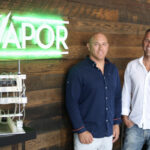Working to a different beat
Making flexible working acceptable in every New Zealand workplace by 2025 – that’s the audacious goal of Freerange Works’ founders Sarah Brooke, Aimee Mitchell and Kerryn Strong, and they are […]
Making flexible working acceptable in every New Zealand workplace by 2025 – that’s the audacious goal of Freerange Works’ founders Sarah Brooke, Aimee Mitchell and Kerryn Strong, and they are more than up for the challenge.
Workin’ 9 to 5 is enough to drive you crazy” – that’s how US singer Dolly Parton summed up the workplace way back in the early 1980s. Now, almost 40 years later, three young Kiwi mums are making an all-out assault on inflexible workplaces around the country, which are still driving many ‘9 to 5’ workers crazy.
Flexible workplace advisory Freerange Works is the brainchild of Sarah Brooke, Aimee Mitchell and Kerryn Strong – three women who all realised that lots of Kiwi workplaces were thinking about flexible working but needed support to implement it successfully. They also recognised that recruitment needed a fresh approach to specifically manage the talented people looking for flexibility and connect them with flexible workplaces.
Sarah had known Kerryn for years and met Aimee at the kindy their daughters attended. Their past careers were a perfect blend of skills and knowledge required to launch a flexible workplace consultancy. Sarah had been involved in the Government pilot for ‘Flexible working by default’; Aimee is a marketer frustrated by the lack of flexible options for mums; and Kerryn knew all about flexible working arrangements, having managed a team of flexible workers for an HR consultancy, written on the subject of flexible working, and acquiring a wealth of experience in HR, culture change and recruitment.
“It was the combination of working on a project to promote flexible working within an organisation, and seeing a disconnect between what businesses were saying about being flexible versus what recruiters were saying to candidates that inspired me to do something about it,” recalls Sarah. “My personal experience was that as soon as I would ask a recruiter if a role they were advertising was open to flexibility they would always say ‘no it’s full time’. That was the end of the conversation.”
Flexible working is important to the three founders of Freerange Works because they see first-hand the number of people struggling to fit their life into the ‘9 to 5’ regime.
“I’ve witnessed the tears of a mother on a ferry saying her work wasn’t open to flexibility so she was burnt out from the constant rush of getting her two young children to daycare before work and collecting them in the evenings five days a week,” says Sarah.
Then there are the many people who can’t afford to live in Auckland so purchase a home in rural towns but still need to earn via remote working.
“I met a father who has taken a year off work to spend time with his young children because he was faced with the option of either ‘all or nothing’ despite him being available during school hours,” continues Sarah, adding that they also see all the time wasted on peak time commuting and the people who struggle to fit exercise into their day to maintain health.
“Flexible working has moved well past mums (or dads) returning to work; it is about fitting work into your life rather than the other way around,” explains Sarah. “The 9 to 5 working pattern just doesn’t suit the way our communities operate in a modern world.”
She lists the new technologies that make flexible working easily doable – such as the many cloud-based and mobile apps. “People no longer need to be in ‘the’ office to be productive. In fact, the opposite is true. When set up correctly the benefits of flexible working are undisputed.”
However the barriers to acceptance are still strong. There are misconceptions around what it means to be a flexible workplace; employers don’t always trust their employees, managers lack the tools and training to manage flexible workers effectively, and business owners can be resistant to change.
“Being a flexible workplace requires a shift to managing by outputs instead of hours,” Sarah explains. “Business owners and employers need to ask themselves – what would be happening in their business, the results they’d physically see, if everyone did what they were hired to do?
“Do they need to SEE their people doing their jobs in order for them to achieve these outputs?
“By setting meaningful KPIs with their people and ensuring managers are upskilled and confident to manage by outcomes, it will not matter where and when the work is being done and opens up a whole raft of flexible working options for themselves and their people.”
Progress and points of difference
So far the business has exceed their expectations, says Sarah. “We got our first client in just under four weeks and the momentum has continued.”
They’ve naturally had the backing of their husbands, plus support from brand agency Chemistry, MyHR’s Jason Ennor, and Sarah’s dad Raymond Khouri, who is a chartered accountant and has donated his services for a year.
Sarah says making Freerange Works an authentic flexible workplace is a non-negotiable. A case of practicing what they preach. “Our approach is always – what would we recommend our clients do? So, we research what technology could assist us and test it out. ‘Slack’ has been particularly life-changing for enhancing the way we work and communicate with one another, and ‘Harvest’ has been excellent for tracking client projects and where our time is spent in general.”
As for flexible working, Sarah there is no one size fits all. To implement it successfully businesses need to have a personalised and consistent approach. They must proactively discuss flexible working requirements with their people and create a culture where employees feel that they can leave (the office) ‘loud and proud’ without judgement.
“This is where we come in. We help organisations develop their flexible working strategy and flexible working policies whilst ensuring legislative compliance, and help them transition their employees – in an engaging and consultative way – to a flexible working model.
“Education is integral to having a consistent approach. We educate leaders on what flexible working arrangements they have available to work with, how to manage flexible work arrangements, how to set expectations, set goals and review performance, all with this new shift of mindset.
“Essentially we create a self-driven, output-based performance management culture,” Sarah says.
When it comes to recruitment, it’s ‘culture fit’ that counts, she adds.
“We make a point of understanding our client’s company culture and get a clear idea of their parameters around flexibility for each role. This means we can reach people who sit outside the boxes of ‘full time’ or ‘part time’ to get the best person for the job. We determine employers’ ‘must haves’ from their ‘nice to haves’ and match their requirements with potential candidates from the outset of the recruitment process.”
Recent studies and reports support a strong business case for flexible working arrangements, and a flexible workplace helps organisations to become an employer of choice, explains Sarah.
“Having a flexible workforce also directly reduces the costs of running an organisation. Allowing some or all of staff to work remotely, for example, can reduce business overheads, leading to substantial cost savings.”
LinkedIn’s 2019 Global Talent Trends report reveals that in the past two years alone, there’s been a 78 percent increase in job posts on LinkedIn that mention work flexibility. And in just four years, there’s been a 24 percent increase in the number of people who say flexible work arrangements are a very important factor when considering new jobs.
Big organisations are setting the tone for smaller businesses too. Perpetual Guardian’s example is the one that made headlines around the world when they trialled a company-wide four-day working week, and gave staff the flexibility of choosing which ‘extra’ day to have off.
The company went on to make the four-day working week permanent when the results showed that staff productivity increased by 20 percent.
Trends and goals
There can be no doubt that the workplace of tomorrow will be very different to today’s – and it’s not just about flexibility. “There are two key changes that we have started seeing within the labour market. One has been a change in values in an emerging labour force and the other has been the shift in needs for older workers,” says Sarah.
She points out that according to the 2018 Deloitte Millennial Survey, ‘Flexibility’ and ‘Positive Workplace Culture’ were ranked a very close second to financial rewards when choosing to work for an organisation for both Millennials and Gen Z.
“This will be an important thing to consider when businesses are competing for top talent in the future.”
Retirees tapering off their hours but not ready for retirement, are also demanding more flexibility whether being forced to or choosing to, she adds. “By working flexibly they are able to continue participating in the workforce while balancing it with their personal life.”
LinkedIn’s latest Global Talent Trends states that “flexible working used to be a work ‘perk’ but today, it’s increasingly an expectation. In the future you might not get special attention for offering flexibility, but you will probably stand out for not having it (and not in a good way).”
Meanwhile, for Sarah, Aimee and Kerryn the 12-month goal is to be a known leader in New Zealand for flexible working recruitment and HR support.
“Our goal is to place 35 skilled professionals into flexible workplaces over the next 12 months and help six businesses successfully transition to a flexible workplace,” says Sarah. “Knowing that we can make a positive change to the lives of these people, and businesses, is our motivation.
“We’re on the right track. We just need to keep on meeting and talking to employers and business owners, and growing our database of professionals. It takes commitment, perseverance and resilience but we’re up for the challenge!”


